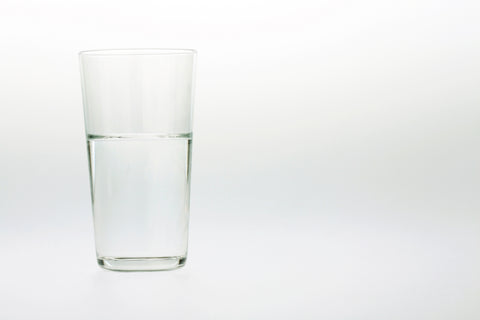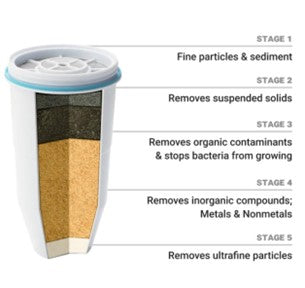Why a Slow Water Filtration System Is Best

We live in a world of instant gratification. Items we order online are shipped in just two days, sometimes overnight. We can communicate instantly with anyone, anytime, anywhere in the world. And access to clean drinking water is as simple as turning on a tap.
But in some cases, like with your tap water, fast isn't always better. Tap water can contain several common contaminants, from lead to pesticides. Sure, that water's been treated, but that doesn't mean it's completely clean. One of the best ways to get truly clean drinking water is to filter it—slowly.
Given the dozens, sometimes hundreds of contaminants running through your drinking water, you want a filter that's going to really work, and that can take time. So, slow filtration is a good thing.
Best Types of Filtration
There are several types of water filtration on the market, all with varying methods for delivering clean drinking water free of certain contaminants. It’s important to know the available options before you can determine why ZeroWater offers the best drinking water solution. Here are some commonly used and effective types of water filtration.
Ion Exchange
Simply put, ion exchange technology, also sometimes called deionization, removes undesirable ions (molecules) and replaces them with ions—hydrogen and hydroxide—in the filter's resin beads. Those ions combine to produce H2O, more commonly known as water.
Deionization effectively removes minerals like calcium, magnesium, and heavy metals. Science of that scale can take some time.
Reverse Osmosis Systems
Reverse osmosis systems are highly effective at removing a wide range of contaminants including heavy metals, dissolved solids, chemicals and microorganisms. They work by forcing water through a semipermeable membrane, leaving impurities behind.
Activated Carbon Filters
These filters use activated carbon to remove organic compounds, chlorine, volatile organic compounds and some heavy metals from water. They are often used in combination with other filtration methods.
Ultraviolet (UV) Purification
UV purification systems use ultraviolet light to disinfect water by killing bacteria, viruses, and other microorganisms. While it doesn't remove particulate matter, it's effective against biological contaminants.

Distillation
Distillation involves boiling water and then condensing the steam back into water. It effectively removes contaminants that have a higher boiling point than water, leaving them behind.
Ceramic Filters
Ceramic filters are often used in conjunction with other filtration methods. They can effectively remove bacteria, protozoa, and some particles from water.
Gravity Filters
Gravity filters use the force of gravity to push water through a filtration medium such as ceramic, carbon, or hollow fiber membranes. They are often portable and suitable for use in areas with limited access to clean water. Regardless of the type you choose, it's important to regularly maintain and replace filters according to the manufacturer's instructions to ensure optimal performance.
ZeroWater's 5-Stage Deionization Filtration: How Does It Work?

Our filters also reduce 99% of lead and 95% of the forever chemicals PFOA/PFOS to provide clearer drinking water in every sip. All of this and more combine to make ZeroWater the best home drinking water filtration system you can buy.
So, ion exchange technology is a better filtration system because it's slower. But why exactly is that?
Fewer Impurities
The slow filtration process means more dissolved solids are removed from the water. Simply put, the longer the water remains in the filter, the more time the filter has to remove those dissolved solids. And especially in the case of ion exchange filters, where a chemical reaction is taking place, slow filtration means more ions are exchanged.
Better Taste and Appearance
Total dissolved solids like metals, salts, etc., can affect the taste and appearance of your water. Chlorine is used to sanitize drinking water. But too much can make you feel as though you're drinking pool water. With ion exchange technology, those undesirable ions are removed and replaced with hydrogen and hydroxide ions that are tasteless and clear in appearance.
Reusable Containers
Even if you're recycling water bottles, you're still going through a lot of plastic when you buy bottled water. With a filter pitcher or dispenser, you reuse the same container and just replace the filters when needed. And because filters last weeks or months, you're replacing them a lot less frequently than you'd be buying bottled water. This makes a home water filtration system a more economical choice.
Filtration You Can See
When you use an ion exchange filter, you can see cloudy, particle-laden water go in and clear water come out. You know for certain that virtually all total dissolved solids have been removed from the water you're drinking. That peace of mind alone is worth the longer filtration time.

Slow Down for Better Water
Replacing your bottled water or fast water filtration system is not only in your best interest, it's easy. ZeroWater has everything you need to provide your family with less expensive, cleaner, healthier drinking water, from water pitchers and dispensers to filter replacement packs and total dissolved solids meters.
We're confident that once you try water from a ZeroWater filter, you'll never go back. Water filtered with advanced 5-stage technology and filtration performed at the molecular level make ZeroWater the best home drinking water filtration system on the market.
If you'd like to learn more about how ZeroWater's ion exchange technology works, you'll find additional information here.
